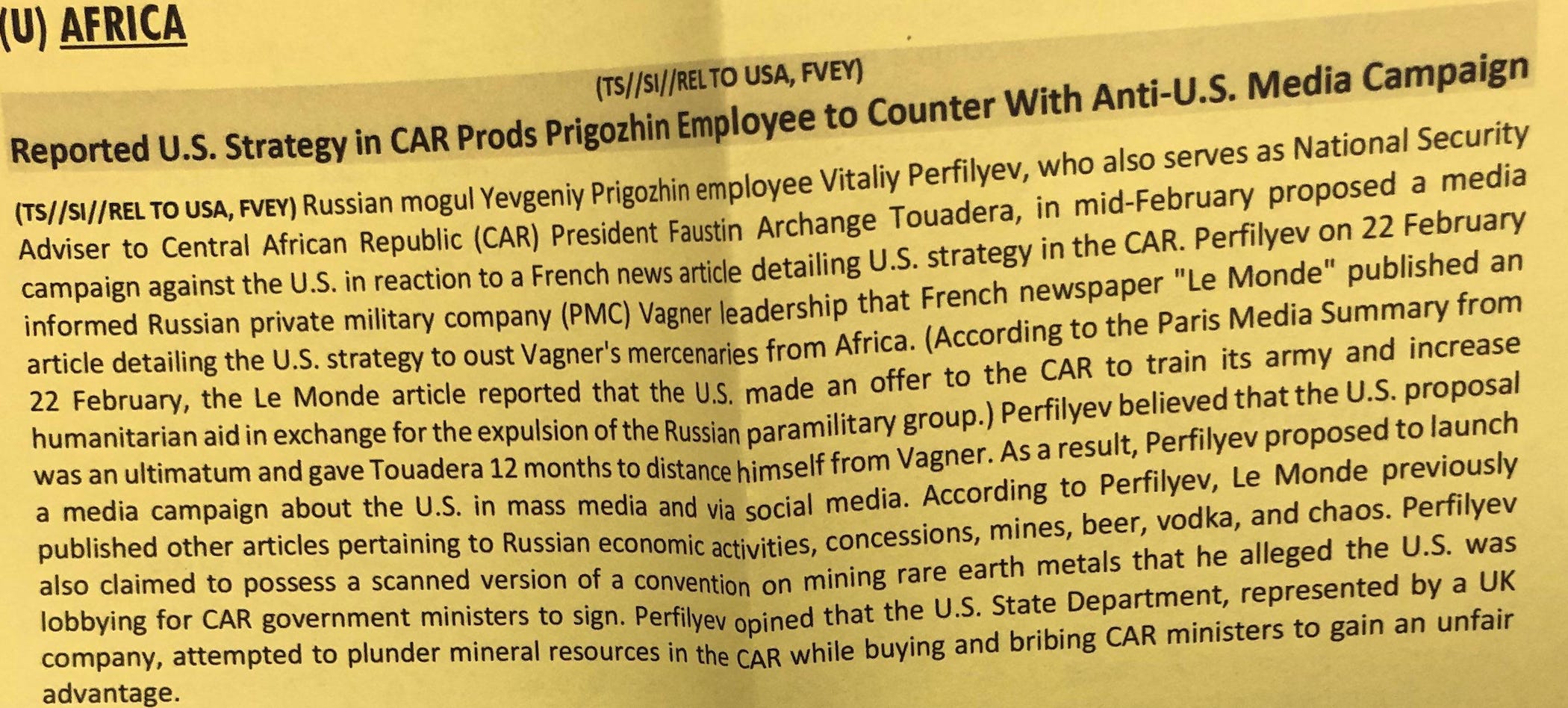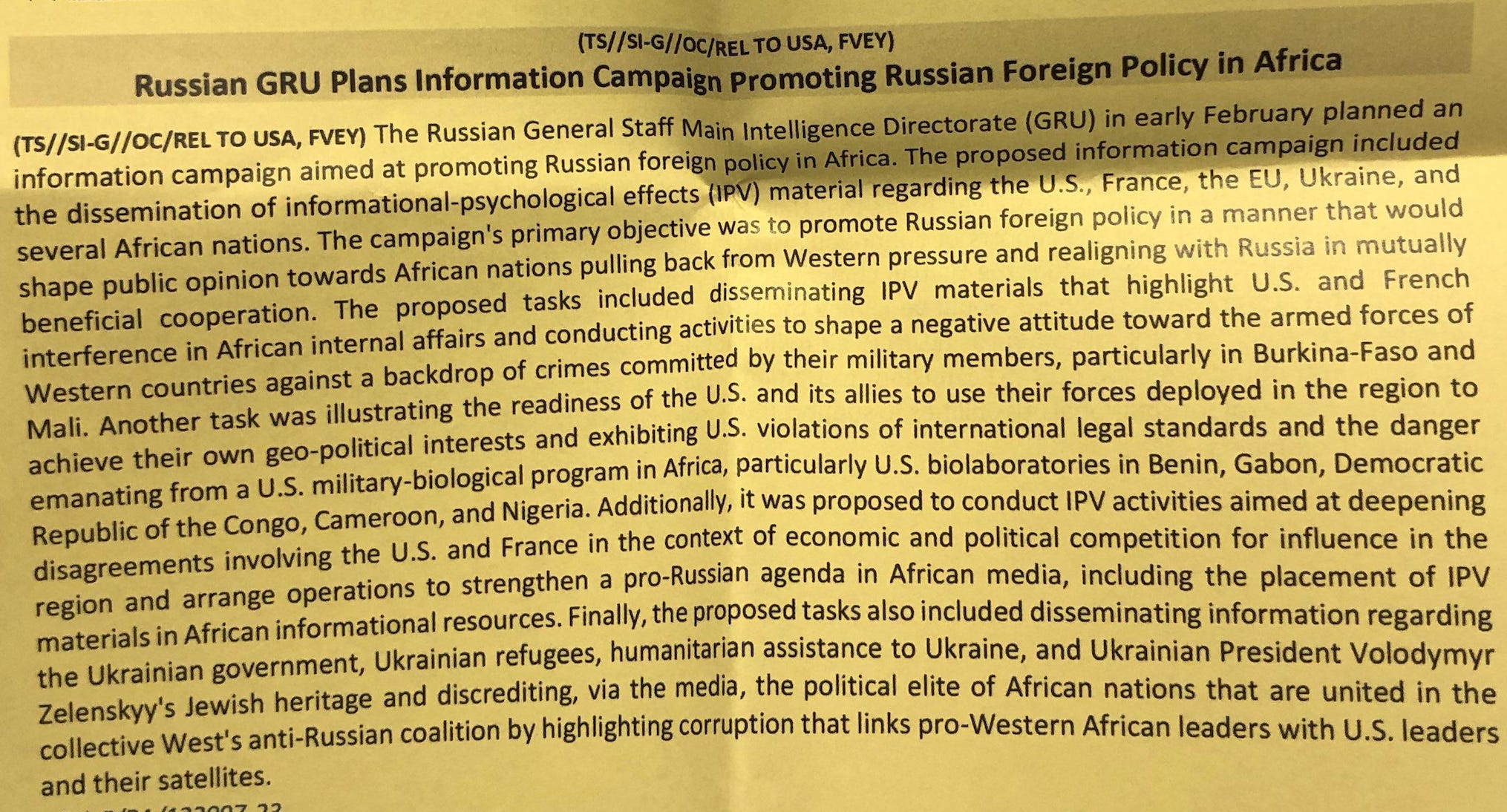Russia's Scramble for Africa
The classified Discord Leaks give us a window into Russia's frenetic ambitions in West Africa and the Sahel.
There is a scene I cannot get out of my head: A burly white man in a green camo t-shirt is jumping, his hands straight up in the air, as Barbie Girl by Aqua blasts through some loudspeakers. Dozens of kids, the offspring of local Central African Republic officials, are enthusiastically mimicking the dance.
Through the short video, there’s a small watermark in the center: A small logo of a soldier in a balaclava playing a violin. Beyond him is a smirking skull logo. Next to it is the name of the Telegram channel where the video was first uploaded: Wagner Orchestra.
The man dancing is a trainer — and, potentially, much more — for the Wagner Group, the notorious semi-private Russian military contractor.
Yevgeny Prigozhin, the Group’s founder, knows a thing or two about propaganda. He was responsible for setting up the Internet Research Agency, hiring squads of online trolls and digital advertisers to muck about in Western politics. And he stood up Wagner, to help project Russian power around the world, without all the nasty scruples of international law.
You’ve probably seen plenty of headlines about Prigozhin and Wagner — his status as a hard-nationalist pretender to Vladimir Putin’s throne, their brutal tactics in the Bakhmut meat grinder. You may be less familiar with their lore and reputation: The violin, for example, is a vague reference to composer Richard Wagner, a favourite of Prigozhin and, incidentally, Adolf Hitler. The group, continuing the music motif, uses violin cases to send sledgehammers to their enemies. The sledgehammer, in turn, is a vile allusion to how Wagner thugs brutally murdered a Syrian Army deserter in 2017, and published the video evidence of it.
The sledgehammer-in-a-violin-case made an appearance recently, in an anti-French propaganda video targeted to citizens of West Africa and the Sahel. It involves a Wagner mercenary beating an demonic rat, clad in navy stripes and a red beret, to death with said sledgehammer.
I wrote about the Wagner Group’s alarming rise in Africa, including the wild propaganda campaign, for Foreign Policy. I strongly recommend giving it a read if this topic interests you.
After spending weeks sifting through a series of Prigozhin shell companies, and speaking to those who live and work in the region, it’s safe to say that the situation is complicated. Central Africans, Burkinabè, Malians, and others in the region formerly colonized by France have good reason to dislike and distrust Paris. Their inclination towards the Wagner Group, and Moscow, has virtually nothing to do with what’s happening in Ukraine. Russia offers security and stability, which France has utterly failed to provide. The elected leaders and military juntas in the region feel as though they are treated like equals by the Russians — the same can’t be said for the Élysée.
But like everything involving Wagner, so much is shrouded in secrecy, lore, and propaganda.
So I colored myself intrigued when news broke of the Discord Leaks — the classified U.S. intelligence, published by a 21-year-old National Guard airman. There was plenty in there stemming from intercepts of senior Wagner officials.
The documents shed new light on just how tightly the Wagner Group has integrated into West Africa and the Sahel, and reveal how Prigozhin’s media machine is going into full drive to discredit France and the United States in the region.
So, on a very special — subscribers-only — Bug-eyed and Shameless, we read some classified intelligence on Russia’s scramble for Africa.
One thing that, I think, bears noting about the Discord Leaks is that they are not the crown jewels.
Certainly, they are classified: You’ll see markings like TOP SECRET, SI-GAMMA (Special Intelligence, relating to signals intelligence), ORCON (Original Controlled, not to be shared beyond the department), NOFORN (no foreign nationals), FVEY (relating to the Five Eyes intelligence partnership) and so on. But these are briefing notes that blend intelligence from a variety of sources, from media monitoring to diplomatic wiretaps, and are not the raw intelligence. Which isn’t to say that they should have been leaked — this is, without a doubt, a calamitous breach — but they are unlikely to unmask and jeopardize field operatives, implicate foreign assets, reveal sources or methods, or anything like that. More on that at the end of this newsletter.
But, suffice it to say, don’t be alarmed that I’m including snippets from these documents in this newsletter.
Although, if I don’t send another dispatch on Friday, would someone mind calling Guantanamo to see if I’m there?
Le Monde is not enough
The documents offer some fascinating insight into just how Prigozhin has weaselled his way into these African countries. The intelligence reports that Vitaliy Perfilyev, a Prigozhin employee, actually serves as the national security advisor to the president of the Central African Republic.
This fact was quietly released in late February, right around the time that this intelligence would have be shared with some allied nations, when the European Union sanctioned Perfilyev, citing him as a “key figure.” Kyiv sanctioned him as well, showing just how liberal the flow of intelligence is between Kyiv and Washington — even when it pertains to Russia’s activities on other continents. (Or, alternatively, that the E.U, or perhaps Ukraine, is the lead on this intelligence collection.)
Through an intercept of a conversation between Perfilyev and Wagner leadership, the intelligence assessment details a planned "media campaign about the U.S.” It seems Perfilyev was spooked by some particularly credible reporting in Le Monde about the growing ties between Bangui and Wagner, and an apparent American plan to disrupt it. Part of Perfilyev’s proposed smear campaign was a document claiming to show it was the United States – not, as in reality, Russia — which sought to bribe local officials to “plunder mineral resources.”
Looking back at that late February E.U. sanctions package, it includes a small media outlet: Radio Centrafricaine Lengo Sengo. The station, the E.U. alleges, is funded through a Prigozhin shell company and is a tool of Wagner’s propaganda campaigns in the Central African Republic. “Its ultimate objective is to manipulate public opinion,” the E.U. alleges.
The station has recently run articles attacking Human Rights Watch — which has called out Wagner atrocities in the Sahel. It’s interesting to see how this intelligence could have fed into these sanctions.
Separate from that, the signals intelligence gave Washington the tip-off to a Russian intelligence plan to launch an information campaign targeting a number of countries.
The planned campaign, which would include “the dissemination of informational-psychological effects (IV) material regarding the U.S., France, the EU, Ukraine, and several African nations,” would play all the hits: Highlighting American and French interference in African internal affairs, calling out human rights abuses by Western soldiers, and underscoring the corruption of pro-Western African leaders.
Minions: The rise of GRU
There are some particularly eye-popping aspects of this propaganda campaign. Through social media and loyal local media, the GRU — Russia’s military intelligence — planned to disseminate “information regarding the Ukrainian government, Ukrainian refugees, humanitarian assistance to Ukraine, and Ukrainian President Volodmyr Zelenskyy's Jewish heritage.” It’s interesting because, like I said, the mood in those former colonized countries seems to be more driven by distrust of France locally than by any particular opinion of the war in Ukraine. Pursuing an anti-semitic anti-Zelensky campaign strikes me as offside. But what do I know, I’ve never meddled in a single African country.
Where my eyebrows really shot up, however, is here:
Another task was illustrating the readiness of the U.S. and its allies to use their forces deployed in the region to achieve their own geo-political interests and exhibiting U.S. violations of international legal standards and the danger emanating from a U.S. military-biological program in Africa, particularly U.S. biolaboratories in Benin, Gabon, Democratic Republic of the Congo, Cameroon, and Nigeria.
I’ve written at length about Russia’s constant attempts to make this “biolabs” conspiracy theory happen. (Dispatch #6) While it has only been marginally effective in the West, there is reason to be worried about the effect it could have elsewhere. For a variety of reasons, there is an undercurrent of distrust of medical science in some parts of Africa. Amidst waves of the Ebola virus in the Congo, for example, hundreds of doctors have been attacked, kidnapped, even killed — some attacks were claimed by terror groups and local militias, whilst others stemmed from inequities in the humanitarian response. Suffice it to say: The last thing that the Congo needs is a disinformation campaign alleging that American-funded biological research facilities — which are helping in the fight against Ebola, the Marburg virus, and other deadly epidemics — are actually the source of the problem. Even if the vast majority of locals ignore the propaganda, convincing a small number of people could still be a disaster.
I should say: I keep my ear to the ground of Russian propaganda, and some French-language chatter from around west/central Africa: I have not seen any evidence that this information campaign has been put into action. Sometimes you intercept a plan that never comes to fruition, c’est la vie.
Lord of war
One of Russia’s primary appeals in the region is pretty straight-forward: Weapons. When the Central African Republic was struggling to contain rebel movements in the North, it appealed to the international community. The international community, however, had slapped a weapons embargo on the country in 2013, following a coup.
There’s logic to the ban: The country has been riven by a civil war since 2012, and there was a fear that more weapons could lead to more violence.
At the same time, part of the instability was driven by a feeling that neither Bangui nor their French military helpers could not keep civilians safe. Russia’s foot in the door was an offer to get the embargo relaxed, ship tonnes of weapons to the country’s military, and fly in a squad of special forces trainers: The Wagner Group.
It was a perfectly fine diplomatic coup in 2021, when the deal went down, but as Russia faces depleting stockpiles of weapons amidst its hopeless war in Ukraine, how can it justify the continued expenditure? These deployments are not minor: A February 26 intercept puts the number of Wagner contractors in Mali alone at 1,645. While Russia has scored a propaganda coup by boasting of African volunteers fighting in Ukraine, and there are reports it is successfully pilfering diamonds and other minerals, Moscow is absolutely putting more into the Sahel than it is getting in return, at least in the short-term.
These documents reveal that Wagner representatives “met with Turkish contacts to purchase weapons and equipment from Turkey for [W]agner’s efforts in Mali and Ukraine.” Mali, apparently, went so far as to promise to buy weapons from Turkey on Wagner’s behalf.
Russia’s reach may ultimately extend its grasp in the region. Not only does it want to become the military patron of the Central African Republic, Mali, and Burkina Faso: But it wants to keep expanding.
In a propaganda video published last year, a burly Wagner fighter joins scrappy soldiers from Mali and Burkina Faso to slay armies of deadly French zombies and cobras (watch for yourself.) At the end of the video, the gang heads to Côte D’Ivoire, amid explosions.
While we don’t even know if these ridiculous cartoons are actually produced by Wagner, or whether they amount to fan art, the government in Yamoussoukro seems to be taking the threat quite seriously. A senior official assessed that Wagner “could use its presence in Burkina Faso and Mali to destabilize Côte D’Ivoire, according to a signals intelligence report.” (I imagine news of this intercept will not endear the Ivorian government to the Americans, nor will the repeated misspelling of “Ivoirian.” Although, who am I to cast stones in that regard?)
A word on leaks
Given how broadly they’ve spread, I’m surprised to see so few outlets publishing the Discord Leaks themselves.
CNN, and some others, have reported on some of the details you’re reading about here, but not the documents themselves.
I can appreciate the apprehension, to a degree. After all, there are some details contained in some of these documents which could, ostensibly, reveal Ukrainian plans and tactics — although if the GRU needs to read about the details of these leaks in the Washington Post, then maybe they’re in even worse shape than we thought. (And, as we know, Russia grabbed these leaks pretty quickly, and went about trying to spread forgeries claiming to show that Ukraine is utterly boned.)
When Edward Snowden exfiltrated a trove of NSA documents, outlets around the world clamored to — after careful consideration — publish them. What’s the difference?
The documents are regularly being purged from Twitter and Discord. Even Bellingcat is censoring the full detail of the records, despite some of them being splashed all over the web.
Newsweek is, I think, one of the only major outlets to publish some of the documents in full.
We, as journalists, have an obligation to act responsibly: I have, in the past, withheld or redacted documents which could identify confidential informants, spies, or sensitive investigative techniques.
These documents are embarrassing to the Pentagon, for sure — both because they were leaked, and because they show the U.S. government intercepting conversations of friendly or neutral foreign nations. But protecting the Pentagon from embarrassment is not our job.
And these documents are already available. They are already in the hands of all the people that they should not be in the hands of.
This is all to say: It is not journalists who are imperilling U.S. intelligence operations by publishing these leaks, the U.S. government did that to themselves by giving a 21-year-old access to highly classified material. The horse is out of the barn.
That’s it for this special dispatch. I’m hoping to have another one out Friday.
As always, feel free to hit me up in the Substack chat, via Notes, or on Mastodon.
If you’re looking for something to watch this week, I cannot recommend Navalny enough. It is riveting, harrowing, inspiring, infuriating. Especially amid news that he has, yet again, been poisoned in prison; and that fellow freedom fighter Vladimir Kara-Murza has been sentenced to 25 years in prison, it’s worth the watch.


















Many thanks. Good to keep up. The question is whether the West cares even now. France's attitude screams "Africa Doesn't Matter".
Gwynne Dyer often got an audience to sit up for years, by repeating "The Middle East Doesn't Matter", his point being the same as that rant in "Syriana", where Matt Damon notes that Saudi's *second* biggest export is "Used Stuff". The ME didn't matter to the West, intrinsically: just their oil.
If we cared about African lives, we would have interfered in the Congo's civil war, and its 5 million dead. Or done more during COVID. One suspects we worked hard on ebola so it wouldn't come for us, mostly.
The diminution of oil as a strategic resource over the next decade or so will change a lot of politics, revealing who intrinsically matters and doesn't. And you can see the huge priority already being put on Africa not mattering as a source of the new vital metals - either by finding more, or inventing new renewables that don't need them.